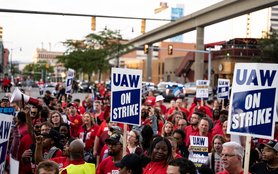Dr. King promoted a vision of economic justice and equality where all people could work with dignity to support themselves and their families. Fifty years after his death, persistent economic inequality—particularly along racial lines—makes clear that there is much more work to be done to achieve King’s vision.
As we remember the towering legacy of Dr. King, we honor his contributions to the fight for civil rights and economic justice. In my work in Mississippi, we feel the sharp edge of economic precarity and working poverty every day, and rededicate ourselves to the mission that Dr. King articulated so powerfully.
I work with DSC Training Academy, located in Jackson, Mississippi—a resilient, majority-Black city that labors under the cloud of systemic racism and poverty. (We even fight for access to clean water!) Our work focuses on empowering both men and women by ensuring that they’re able to care for themselves and their families without sacrificing their jobs or economic security to finally grasp the American Dream.
We equip and prepare Mississippians with vital skills in the transportation industry, which can lead to higher wages in sustainable employment. These skills, tools and resources enable people to empower themselves and their families, and to improve their standard of living.
The COVID-19 pandemic exposed how essential our nation’s truckers are to the supply chain across the United States. It also revealed that the trucking industry needs a larger force of reliable workers. At DSC, we believe that workforce should be diverse, so we are recruiting youth, women, and people of color into our training and employment program, with a particular focus on women of color.
Turning the tide on generations of exclusion
The women we work with are looking for new employment opportunities that will provide economic security. They want jobs that protect them from economic upheavals resulting from natural and human-made disasters; provide healthcare and open employment opportunities; and enable them to earn a decent wage regardless of the quality of their formal education.
Historically, workers of color—especially in the South—have been denied economic stability and income equality because of race, gender, and class discrimination. We believe that non-traditional jobs like trucking can lift many out of poverty and provide them with opportunities to stabilize their lives, move their families and communities forward, and finally grasp hold of the American Dream.
________________________________________________
"I chose trucking because I was fed up with my old employer. It was not easy to leave my kids, and it took me a year to decide. I’m glad I did because I already have employment with a Mississippi-based carrier company. I chose them because the pay is better than my last job, the benefits are good too--and I can be home every weekend with my family.” --Mrs. S. Harris, recent graduate
Dr. King wrote, “A second evil which plagues the modern world is that of poverty. Like a monstrous octopus, it projects its nagging, prehensile tentacles in lands and villages all over the world. Almost two-thirds of the peoples of the world go to bed hungry at night. They are undernourished, ill-housed, and shabbily clad. Many of them have no houses or beds to sleep in. Their only beds are the sidewalks of the cities and the dusty roads of the villages.” (Nobel Peace Prize lecture, 1964)
Here in Mississippi, we believe we can ease the plague of poverty by training people for better jobs, providing access to healthcare for all, and investing in a flourishing educational system for our children.
We must make sure to highlight the work toward economic justice on more than just this one special day. We need to build toward it every day in every area of business, industry and community. I’m proud to work with DSC to continue to build alliances and conversations to expand economic justice and economic security in and among all our communities in Mississippi.
_______________________________________________________
“I chose trucking because of the limitless opportunities of income and the flexibility. Also, I needed be the change that I wanted to see… meaning that other women can enter into this male-dominated industry too and make this kind of income to live better lives and offer more stability for our families. I choose DSC because it is a woman-owned operation, and I'm about women empowerment. My goal is to one day own a trucking company with all women drivers.”
--Mrs. A. Nichols
________________________________________________________
For several years, Oxfam has been investing in workforce development efforts in Mississippi and Louisiana, believing that, as Dr. King noted, “If a man doesn’t have a job or an income, he has neither life nor liberty nor the possibility for the pursuit of happiness. He merely exists.”
We are proud to partner with several organizations that train and place workers in jobs that offer better pay and more opportunity.



